Chapter I
Significance of and Preparations for the AY 2019 Plenary Council
1.What is the Plenary Council?
At Ritsumeikan University, we uphold the ideal of “believe in the future, live for the future,” based on our founding spirit of “freedom and innovation” and educational philosophy of “peace and democracy.” Our educational mission is to strive to cultivate individuals equipped with solid academic abilities who can give free rein to their individual strengths and play active roles as global citizens imbued with a sense of justice and ethics.
Our students have a great variety of backgrounds and individual talents, and our faculty and administrative staff members across the various different parts of our university organization work together to suppor t these students in learning and growing as individuals capable of independently realizing our R2020 Academy Vision of “Creating a Future Beyond Borders.” Our aim is for both undergraduate and graduate students to learn from one another in healthy competition, in a “learning community” that encompasses all aspects of student life, curricular and extracurricular realms included. The Plenary Council of the University is a forum for consultation and discussion with students as we pursue these activities.
The Plenary Council of the University (hereafter simply “Plenary Council”) is an organ established in order for all members of the Ritsumeikan University (“RU”) learning community—undergraduate students, graduate students, faculty and staff, and the Executive Board of Trustees—to discuss and engage actively in improvements and reforms to the conditions of education, research, and student life. Meetings of the Plenary Council are conducted in line with the principle of self-government by all constituents of the university, and are attended by representatives of RU’s four primary components: the Student Union and Graduate Student Council as the self-governing organizations of undergraduate and graduate students respectively, the Faculty/Staff Union, and the university authorities (Executive Board of Trustees, membership of which includes the Deans of each College). The Ritsumeikan Co-operative (hereafter “Co-op”),which provides support for student life,participates as an observer.
RU’s Plenary Council reviews achievements in education and student support and confirm future directions, as well as pursuing discussion of tuition fees. This process involves holding discussion meetings between students and Deans and other officials to discuss issues within each College and Graduate School, and a variety of forums to discuss issues in education, student life, and campus infrastructure, to ensure that the university authorities take into account students’ views as they pursue improvements and reforms.
Plenary Council of the University
An organ for consultation and discussion established in AY 1948 following a proposal by the Student Union. Until AY 1979, meetings of the Plenary Council were held on an ad hoc basis in association with tuition proposals made by the university authorities (Executive Board of Trustees). The Rules of the Plenary Council of the University confirmed in 1988 state that the purpose of the council is to contribute to the advancement of the Ritsumeikan Academy through discussion of important matters pertaining to university management: (1) academic enhancement and campus life assistance; (2) tuition and academy financial management; (3) academy operational plans; (4) other matters considered necessary by the Plenary Council. The most recent Plenary Councils were held in AY 2016 and AY 2018.
R2020
R2020 refers to the strategic reforms that the Ritsumeikan Academy has been pursuing under the Academy Vision 2020 (Creating a Future Beyond Borders) and the medium-term plans to realize that vision (first half AY 2011-2015; second half AY 2016-2020), which were formulated to ensure that Ritsumeikan continues to be an academy of choice in the years up to 2020.
2.Review of the Previous Plenary Council
The last Plenary Council was held in the2018 academic year (“AY 2018”). In light ofthe fact that little more than one year hadelapsed since the Plenary Council beforethat, which was held in AY 2016, and thatthe second phase of the R2020 plan (AY2016-2020) was still in progress, at thisPlenary Council it was difficult to focus ona comprehensive review of the outcomesof education and student support projectssince the AY 2016 Plenary Council. However,there were numerous areas in whichprogress had been made, issues that hadcome to light through analysis of studentconditions, and discussion points putforward by each member of the PlenaryCouncil on matters of education and studentlife. It was therefore decided to usethese various matters as starting points fordiscussion. The Plenary Council also discussedthe new tuition and financial managementpolicies for AY 2019 and beyond,as proposed by the university authorities.These discussions were recorded in theMemorandum of the AY 2018 PlenaryCouncil of the University, the contents ofwhich are summarized in “Discussionsto Date” in Chapter 2 below. In regard totuition policies, the university authoritiesproposed tuition fees for students enteringundergraduate programs in AY 2019 andthose entering graduate programs up toAY 2020. It was confirmed that tuition policiesfor undergraduate students entering inAY 2020 and beyond would be the subjectof discussion in another Plenary Council tobe held in AY 2019.
3.Toward the AY 2019 Plenary Council
As explained above, it has been confirmedthat the AY 2019 Plenary Councilwill continue discussion of the matterstabled at the AY 2018 Plenary Council:the current conditions in academic affairsbased on the discussion of tuition policies,and associated issues raised by theStudent Union, which include enhancingand increasing the visibility of learningquality (both curricular and extracurricular),and improving campus environmentsincluding dining options, security/safety,and campus no-smoking policy. In addition,the university authorities will tableproposals for undergraduate tuition feesfor a further two years (AY 2020 and 2021)that are linked to the medium-term plansand tuition policies at this point of transitionfrom the R2020 academy plan (thatruns from AY 2011 to 2020) and the R2030 plan (AY 2021 to 2030). Moreover, thequestion of whether or not to align graduateschool tuition policies with the policycycle for undergraduate tuition (i.e., to extendthe current policies to AY 2021) willbe considered in conjunction with overallpolicies for the graduate schools. Thesematters provide the starting agenda forthe AY 2019 Plenary Council.
With a view to fur ther advancing the work on educational improvement and student suppor t under taken thus far toward the establishment of the “Ritsumeikan Model of Learning” and to form a basis for planning the next ten years of development (AY 2021-2030), we have initiated a policy of “Learning Innovation that co-creates [collaboratively develops] extension, interconnection, and change in learning” (hereafter the “co-creation policy”). This co-creation policy will be implemented over four years from AY 2019 to 2022. The aim of the policy and the various initiatives that will follow it is to do more to kindle each individual student’s intellectual interest, to foster an autonomous, self-motivated approach to learning and a spirit of free challenge, and to transform the university into a place that enables students to gain a real sense of personal growth through their learning by the time they graduate. These will be long-term themes in the years leading to AY 2030. In the course of this and subsequent Plenary Councils, the university authorities will present proposals for activities that will form part of this co-creation policy.
Building on the outcomes of the AY 2018 Plenary Council, the AY 2019 Plenary Council will be a forum for discussion on major steps forward in the directions outlined above. We look forward to the active par ticipation of students and all other members of the Ritsumeikan community.
R2030
The Academy Vision R2030 (Challenge Your Mind, Change Our Future) was adopted in August 2018 as a new vision for the years up to 2030. On the basis of this vision, discussions are currently underway toward the establishment of a Challenge Design (medium/longterm plan) to be implemented from AY 2021.
Schedule for the AY 2019 Plenary Council

4.Expanding Fields of Learning/Support and Student Activities
As stated earlier, we have been workingon a variety of student support programsdesigned to produce individuals who canmake useful contributions to society, inaccordance with our founding spirit, educationalideals, and the principles of theRitsumeikan Charter. One of the majorpillars of R2020 – the medium/long-termplan for the Ritsumeikan Academy up toAY 2020 – was “learning communities andlearner-centered education.” We havebeen providing support for diverse formsof learning under this plan, with the aimof establishing the Ritsumeikan Modelof Learning, a learning style in whichstudents can autonomously extend theirlearning capacity beyond borders, in additionto developing specialized expertise. Inaddition to curricular activities, overseaslearning, and internships, we have directedsupport to participation in pre-existingextracurricular clubs and circles, and forthe development of diverse communities.For this purpose, from AY 2012 we introduceda new growth support scholarshipprogram that supports the establishmentof self-motivated communities of three ormore students. Each year around 500-650students pursue activities with the supportof this scholarship program, makingit an important incentive for motivated students.Moreover, 3,368 students (as of AY2018) participate in peer support activitiesacross 36 different organizations. It couldbe said that peer suppor t has becomea distinguishing feature of RitsumeikanUniversity, as no other university operatespeer support programs of this scale.
Below is a brief profile of some of the students engaged in especially distinctive activities as the horizons of learning expand in various ways across the curricular and extracurricular realms.
-
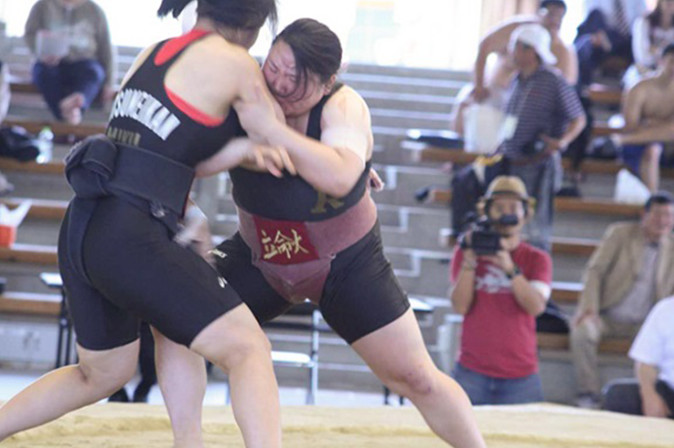
KON Hiyori (4th year student in the College of International Relations)
Recipient of the Ritsumeikan University Athlete and Creator Development Scholarship (Sumo) -
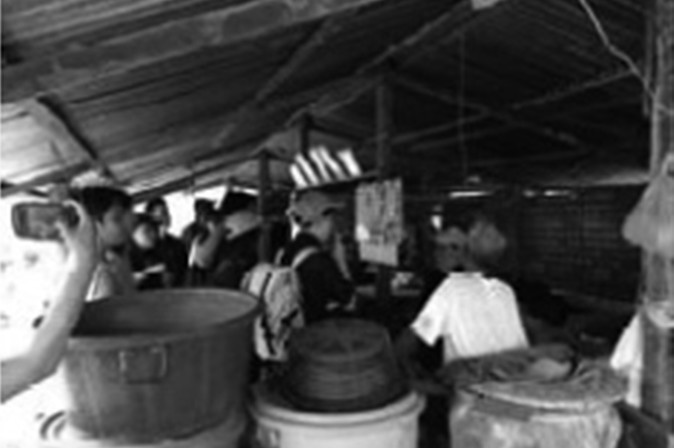
Financial Aid for Development of a Learning Community (Extracurricular Activities) eligible program: SDGs Practical Program in Laos(Agricultural site visit and interviews) -

HINO Minako (2nd year Master’s student, Graduate School of Sociology)
Participated in the Rio 2016 Paralympics -
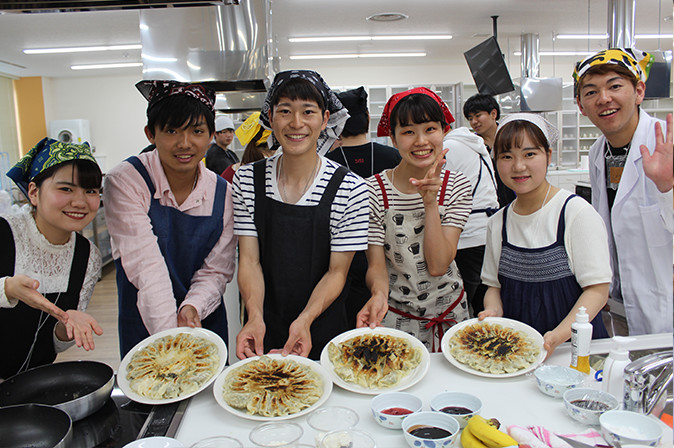
College of Gastronomy Oritor group activity:“Yummy!!!” welcome event for new students -
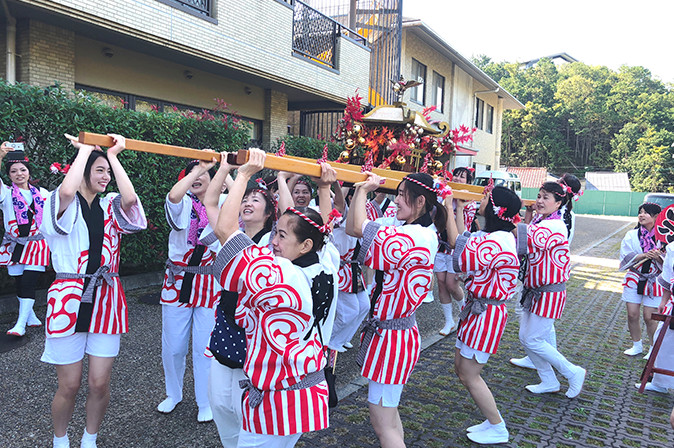
The AVA (Athlete Volunteer Association), recipient of the AY 2018 Financial Aid for Development of a Learning Community, assists with a festival at the Haradani Benzaiten Shrine -
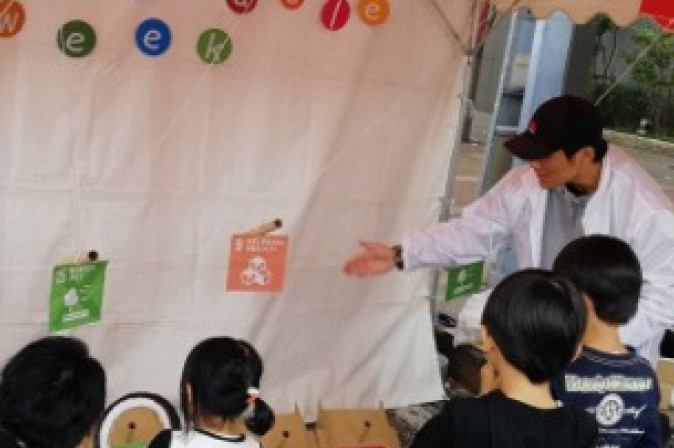
Ritsumeikan University Sustainable Week Executive Committee, recipient of the AY 2018 Financial Aid for Development of a Learning Community, holds “On The Road! Sustainable Week” event -

STROPS, recipient of the AY 2018 Financial Aid for Development of a Learning Community, conducts activities on the theme of “physical education volunteering at elementary schools in the poverty belt of Nanyuki, Kenya.”
Contents
- Chapter I.Significance of and Preparations for the AY 2019 Plenary Council
- Chapter II. Progress of Discussions to Date and Future Directions
- Chapter III. Tuition Policies for AY 2020 and AY 2021
- Document


